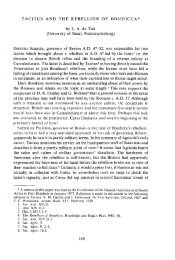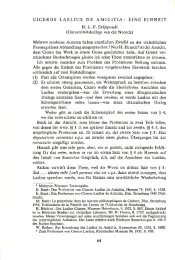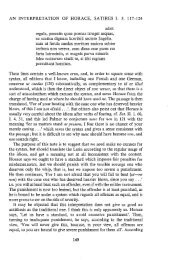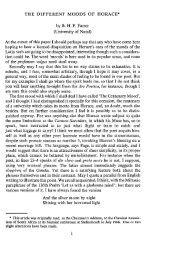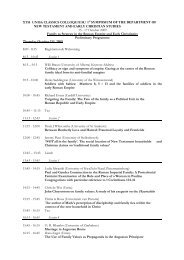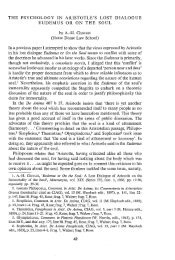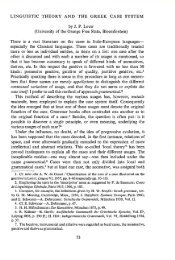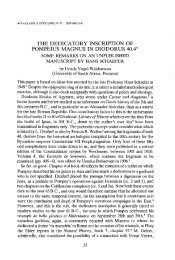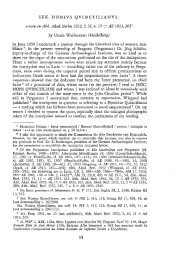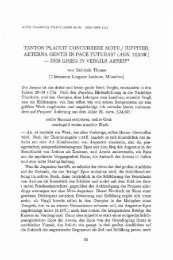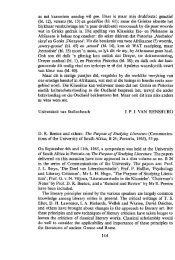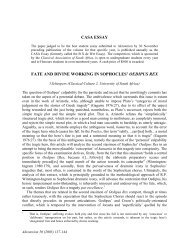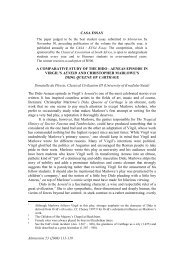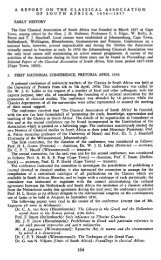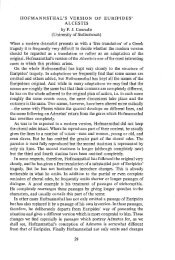FORTUNA IN AMMIANUS MARCELLINUS by C. P. T. Naude ...
FORTUNA IN AMMIANUS MARCELLINUS by C. P. T. Naude ...
FORTUNA IN AMMIANUS MARCELLINUS by C. P. T. Naude ...
Create successful ePaper yourself
Turn your PDF publications into a flip-book with our unique Google optimized e-Paper software.
The history of Constantius follows a similar pattern. Infatuated <strong>by</strong> successes<br />
which he did not deserve, he prided himself wrongfully on his<br />
felicitas. 137 After the fall of Silvanus he behaved insolently, became puffed<br />
up <strong>by</strong> the magniloquentia adulatorum and arrogated to himself too great a<br />
rule for a mortal.1 38 The rebellion and fate of Silvanus form part of this<br />
larger theme. Silvanus' death, accomplished <strong>by</strong> fortuna eventu celeri 139 is<br />
a wrong inflicted upon a victim of integrity and merit, 140 but underlying itand<br />
Ursicinus' share in it 141 -is the story of justice revealed in Constantius'<br />
ultimate end.14 2<br />
One great problem in studying fortuna-tyche in Ammianus is to decide<br />
its relation to Adrastia and Ammianus' belief in the all-controlling factor<br />
of justice. Ensslin has shown that Ammianus can with good reason be<br />
regarded as a determinist, 143 and concludes: 'Eine Fortuna als indignorum<br />
[autrix, wie bei Plinius, hat doch schlechterdings bei Ammian keinen Platz<br />
mehr neben der von ihm eingefiihrten Adrastia-Nemesis, als einem ius<br />
quoddam sublime numinis efficacis, und neben der substantia/is tutela generali<br />
potentia partilibus praesidens fatis, die er selbst als Tochter der Iustitia<br />
137. 15.5.35: insolentia coalitus et tumore, hoc quoque felicitatis suae prosperis cursibus<br />
assignabat, eo more quo semper oderat f01·titer facientes; 'hoc quoque' with reference to<br />
14.10.15, adlapsa felicitate. For the link between personal fortuna andfelicitas, see 21.16.13,<br />
quoting Cicero: felicitas est fortuna adiutrix bonorum, also Cic. Manil. 47, in connection<br />
with the felicitas of Pompei us: fuit . . . quibusdam summis viris quaedam . . . ad g/oriam<br />
et ad res magnas bene gerendas divinitus adiunctafortuna; so too Julian, 25.4.14 along with<br />
25.4.10 ff., fe!icitas in conjunction with outstanding achievements. See also H . Wagenvoort,<br />
Roman Dynamism, Oxford 1947, p. 61, with reference to Cic. imp. Cn. Pomp. 28.<br />
But Constantius' fortuna aided him malis tantum civilibus, n. 107 above; and therefore he<br />
did not know true felicitas, 21.16.13: ergo in perditis impiisque consiliis, quibus Caesar<br />
usus est, nulla potu it esse felicitas. For the correct attitude, Cic. I.e.: de felicitate ... sicut<br />
aequwn est homines de potestate deorum, timide ... dicamus; cf. Erkell, p. 45, and p. 53:<br />
'einer Art von "gottlichem Segen" '.<br />
138. 15.5.37: ut iam caelo contiguus, casibusque imperaturus humanis, magniloquentia<br />
su.fflabatur adulatorum, with reference to Croesus; 17.12.17, the opinion of his contemporaries:<br />
fatum vinci principis potestate vel fieri. Cf. Procopius, 26.8.13: ultra homines<br />
sese efferens, et ignorans quod quivis beatus, versa rota fortunae, ante vesperum potest esse<br />
miserrimus.<br />
139. 15.5.1, along with 1.5.31; cf. de Jonge.<br />
140. 15.5.32: dux haut exsilium meritorum.<br />
141. 15.5.36, Ursicinus was not rewarded for his industrie gesta; cf. 16.12.69, and<br />
Thompson, p. 55. This might alleviate from a purely historiographical point of view this<br />
'sordid story'; see Thompson p. 45, and W. den Boer, 'The Emperor Silvanus and his<br />
army', Acta Class. 3 (1960) p. 105: 'the vile treachery ofUrsicinus'.<br />
142. 21.14.1 f., in conjunction with 21.16.13.<br />
143. Ensslin, p. 75, with reference to 25.3.17: tallletsi prosperitas ... utilitasque consulforum<br />
non ubique concordent, quoniam coeptorum eventus superae sibi vindicant potestates;<br />
but with due allowance for Willensfreilieit (p. 74); cf. 17.8.2 and 21.1.1: 'Da spricht der<br />
alte Soldat aus Arnmian'.<br />
85



